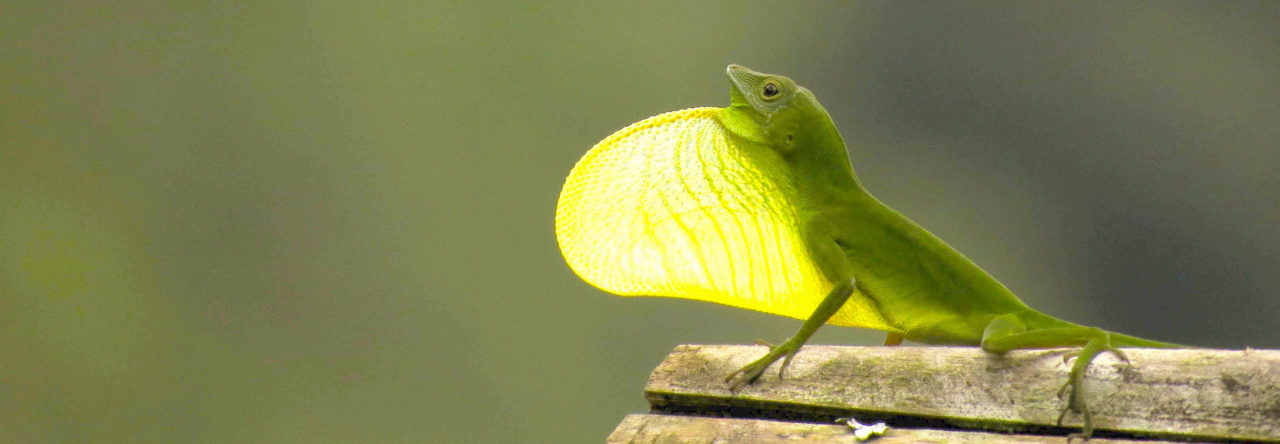Ever wondered what the most viewed post on Anole Annals is? I bet it keeps many of you up late at night trying to guess. So, I’ll tell you. Over the last year, the single most viewed page is the one entitled “The Proper Pronunciation of ‘Anole’.” In that post, an AA reader asked how to pronounce our favorite noun, and many readers responded.
But that was more than two years ago, and languages evolve swiftly. Moreover, many have joined AA’s readership since then. So, I’ll throw out the question again. For what it’s worth, here are my thoughts, as expressed Lizards in an Evolutionary Tree (p.10):
“…honorable, right-thinking people can disagree over whether the correct pronunciation is uh-nole or an-ole. I am less charitably inclined to my ninth grade biology teacher’s uh-no-lee, but, although I have never heard “anole” articulated in that way by anyone else, I am told that it is common in the South, from whence she came (I was surprised to find that this is the preferred pronunciation of the Random House Unabridged Dictionary, according to www.dictionary.com).
As for the origin of the name, Daudin [1802], who named the genus, said that “anolis” was the name the indigenous Caribs used for these lizards. However, there is some possibility that in fact “anolis” may have been their name for lizards in the genus Ameiva and that the correct Carib word was “oulléouma” (see discussion in Breuil, 2002). Right or wrong, Daudin clearly chose the more mellifluous name to bestow upon these lizards! A more interesting, though doubtless less accurate, explanation is the Saba Tourist Bureau’s statement (www.sabatourism.com) that “The scientific name of ‘Anolis’ comes from the popular name of “anole” for these lizards. Anole is an ancient African name, meaning “little devil”, that is given to small lizards in western Africa.”
- New Article on Anolis roosevelti and the Question of Its Survival - March 16, 2024
- Lizard Diving Champions: Trading Heat For Safety Underwater - March 15, 2024
- Do Large Brown Anoles Get the Most Mating Opportunities? - January 6, 2024


Pierre Legreneur
Here is one of the first representations of anoles by Dutertre in 1667. It is noteworthy that our modern anole is called “Gobe-Mouche” (Flycatcher) and anolis in fact corresponds to the genus Ameiva.
Pierre Legreneur
the picture …
James (Skip) Lazell
When I was a teenager in the ’50s and learned French creole in Haiti and the Lesser Antilles everyone called an anole a “z’andolie.” Can’t imagine it’s changed! I bet the origin IS African or Carib Indian…. Skip
Pierre Legreneur
I agree with skip … when I think that some people want to rename the anoles that were at the origin of the Anolis genus “Ctenonotus“…
KarenC
Here in the South in northeast Florida, the common pronunciation of anole is “uh-no-lee”. As a transplant from New England I tend to say uh-nole or an-ole. The average person around here just calls them lizards.
James (Skip) Lazell
Just for the sake of completeness, in Creole ameiva is “abollo,” skink is “mabuyah,” and iguana is “lay-zard.” Skip
Joe Burgess
They use Zandoli in the Windward Islands as well.
I grew up in Florida and have lived here most of my adult life… I too despise uh-no-lee, although i dont hear it often.
Peter Mudde
I was tought.. ( by my herpetology ‘proffessor’ D. Hillenius, of Chamaleon fame) tio pro nounce it as AH-ne-lissss.. But well as we, having had a ‘classical education-i.e. a few years of latin and greek at puberty – used to say, there aren’t recordings of how the romans spoke so .. say what you want.. It’s writing that’s important..
Linda
Floridians are correctly pronouncing the 3-syllable genus name anole (uh-no-lee), which is Latin. In Latin, except for diphthongs, each letter (sound) is pronounced, with the long vowel stressed.